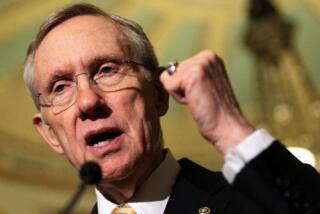A Veteran of 1984 Wars Writes to an ’88 Warrior
- Share via
WASHINGTON — Dear Bill Brock:
By now all the journalists who’ve never run anything but a typewriter are analyzing your work on Sen. Bob Dole’s presidential campaign with the wisdom of prophets looking backwards. Your candidate was mean, your campaign was disorganized, your strategy was incoherent--and you, of course, are responsible for all of it.
Having been both a winning campaign manager--Fritz Mondale’s 1984 fight for the nomination--and a losing one--that year’s decidedly less successful general election battle--I know it looks a lot different from the trenches. For Dole the distance between winning and losing was close; perhaps just a few tactical decisions in a few days’ time. In your case, the critical week was between the Iowa caucuses and the New Hampshire primary.
While you came out of Iowa with an impressive win, your press was less impressive. Pat Robertson’s second-place finish and George Bush’s third place became the big stories. In fact, Bush was getting so beat up in the press that you eased up on your attack. This was a critical mistake that Gary Hart learned too late in facing us in 1984. When your opponent is weakened, increase the attack. Or he may recover.
With Bush you needed to take his most effective attack on you--that Dole was a taxer--and turn it on him. Instead you let your candidate get too sweet too fast. Dole needed to be Dole. In this case, mean as hell. The irony is that Dole didn’t learn from Bush’s experience in 1980, when after winning in Iowa he let Ronald Reagan rough him up in New Hampshire and snatch the nomination away from him.
Part of the problem came from your trust in tracking polls that first showed you gaining and then pulling ahead. A cardinal rule for presidential campaigns is to take a full 500-person survey on the Thursday before a critical election day like New Hampshire. This would have shown you where you were in time for that last media buy for the weekend. It would have shown that your bump from Iowa had died and that a full-scale attack on Bush was essential. Similarly, if you had polled after the Sunday night debate you would have contradicted the erroneous conventional wisdom that Bush had lost the debate and reacted accordingly on Monday.
Not all the mistakes in New Hampshire occurred in that final week. There was never a clear message on why Dole should be President and Bush should not. Your Granite State organization was woefully inadequate. You knew weeks before that you would win Iowa and therefore a good organization in New Hampshire was necessary to take advantage of the Iowa momentum. You badly underestimated Bush’s organizational strength that rested on eight years of prior work and a strong governor with a personal interest in his candidate’s success. In a small state such as New Hampshire, an effective organization is worth 5% to 8% more than the polls show. Allowing for that would have warned you: Even the most favorable polls put the race even.
While everybody points out that you lost it, remember that Bush won it. The veep showed his experience after Iowa by handling his defeat extremely well. His staff deserves credit for shifting his campaign literally overnight from a rather imperial posture of the vice presidency to down-home Georgia. Bush went from Cadillac limousines to caterpillar forklifts without missing a beat.
You know too that the South was lost in New Hampshire. Even Liddy Dole’s Southern charm couldn’t salvage a symbolic win in her native North Carolina. After the press wrote Bush’s political obituary in the snows of Iowa, his comeback in New Hampshire provided him with the greatest “New Hampshire bump” in recent political history. But you also know how close you came to putting Bush away in that first primary. And that’s the point. Presidential politics turn on critical moments and lost opportunities.
If you don’t win Illinois, you and I know it’s all over. But in recounting the wrong turns in a losing effort don’t forget that mix of luck and fate that no campaign manager can control. I know it doesn’t make us sound quite so smart but there’s also nothing wrong with an analysis that concludes: We weren’t quite as lucky as the other guy and it wasn’t our year.
No matter what the reasons for losing, campaign managers need to accept a share of the blame. It comes with the territory, Bill--something you should have known when you took the job.
In solidarity,
Bob
More to Read
Get the L.A. Times Politics newsletter
Deeply reported insights into legislation, politics and policy from Sacramento, Washington and beyond. In your inbox twice per week.
You may occasionally receive promotional content from the Los Angeles Times.










